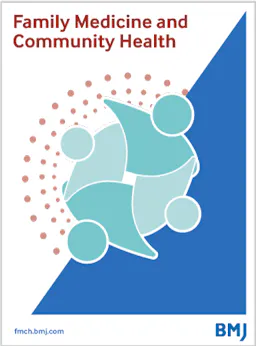在大型学术医疗系统的初级保健诊所实施和评估 "运动即医疗 "项目
IF 4.3
3区 医学
Q1 PRIMARY HEALTH CARE
引用次数: 0
摘要
目的 "运动即医疗"(EIM)是一项全球性倡议,旨在鼓励医疗服务提供者对患者的体育锻炼(PA)进行常规评估和推广。本研究旨在结合电子健康记录(EHR)、调查和访谈数据,从患者、临床医生和医护人员的角度评估 EIM 的可行性、采用、实施和有效性。设计 本研究结合使用了实用稳健实施和可持续性模型(PRISM)和学习评估模型来实施 EIM。从电子健康记录(EHR)中获取的数据,包括身体活动生命体征(PAVS)评分,以及从定性调查和访谈中收集的数据,用于从提供者、员工和患者的角度评估该计划的覆盖面、有效性、采用、实施、维护(RE-AIM,嵌入 PRISM 中)。地点 一家大型学术医疗系统内的五家初级保健诊所。参与者 在研究期间,所有参与诊所共有 24 443 名患者获得了至少一次 PAVS 评分。共有 17 名临床医生完成了调查,4 名临床医生、8 名医疗助理和 9 名患者完成了访谈。结果 各部分和各诊所的实施忠实度指标差异很大,但随着时间的推移基本保持一致,这表明计划的维护程度很高。在 COVID-19 大流行的前 6 个月,大多数就诊都是虚拟的,因此忠实度最高。对于基线不符合 PA 指南的患者,PAVS 平均得分在 6 个月时从每周 57.7 分(95% CI:56 分至 59.4 分)上升到 95.2 分(95% CI:91.6 分至 98.8 分),而对于基线符合 PA 指南的患者,PAVS 平均得分在 6 个月时从每周 253.84 分(95% CI:252 分至 255.7 分)下降到 208.3 分(95% CI:204.2 分至 212.4 分)。实施 EIM 后,35% 的医疗服务提供者估计与患者讨论 PA 所花费的时间有所增加,53% 的医疗服务提供者估计与患者讨论 PA 所花费的时间保持不变。结论 总体而言,本研究证实了 EIM 在大型学术医疗系统内常规初级保健实践中的可行性、采用、实施和维护。从人口健康的角度来看,EIM 是一个值得效仿的模式,可以帮助初级医疗服务提供者在常规初级医疗就诊中有效地解决健康生活方式行为问题。与该研究相关的所有数据均包含在文章中或作为补充信息上传。本文章由计算机程序翻译,如有差异,请以英文原文为准。
Implementation and evaluation of Exercise is Medicine in primary care clinics within a large academic health system
Objective Exercise is Medicine (EIM) is a global initiative encouraging healthcare providers to routinely assess and promote physical activity (PA) among patients. The objective of this study was to evaluate the feasibility, adoption, implementation and effectiveness of EIM from patient, clinician and healthcare staff perspectives using a combination of electronic health record (EHR), survey and interview data. Design This study used a combination of the Practical Robust Implementation and Sustainability Model (PRISM) and the Learning Evaluation model to implement EIM. Data captured from the EHR, including Physical Activity Vital Sign (PAVS) scores, and data collected from qualitative surveys and interviews were used to evaluate the programme’s Reach, Effectiveness, Adoption, Implementation, Maintenance (RE-AIM, which is embedded within PRISM) from provider, staff and patient perspectives. Setting Five primary care clinics within a large academic health system. Participants A total of 24 443 patients from all participating clinics had at least one PAVS score during the study period. A total of 17 clinicians completed surveys, and 4 clinicians, 8 medical assistants and 9 patients completed interviews. Results Implementation fidelity metrics varied widely between components and across clinics but were generally consistent over time, indicating a high degree of programme maintenance. Fidelity was highest during the first 6 months of the COVID-19 pandemic when most visits were virtual. Mean PAVS scores increased from 57.7 (95% CI: 56 to 59.4) to 95.2 (95% CI: 91.6 to 98.8) min per week at 6 months for patients not meeting PA guidelines at baseline and decreased from 253.84 (95% CI: 252 to 255.7) to 208.3 (95% CI: 204.2 to 212.4) min per week at 6 months for patients meeting PA guidelines at baseline. After EIM implementation, clinician-estimated time spent discussing PA with patients increased for 35% of providers and stayed the same for 53%. Conclusion Overall, this study established EIM’s feasibility, adoption, implementation and maintenance in routine primary care practice within a large academic health system. From a population health perspective, EIM is a model to emulate to help primary care providers efficiently address healthy lifestyle behaviours in routine primary care visits. All data relevant to the study are included in the article or uploaded as supplemental information.
求助全文
通过发布文献求助,成功后即可免费获取论文全文。
去求助
来源期刊

Family Medicine and Community Health
PRIMARY HEALTH CARE-
CiteScore
9.70
自引率
0.00%
发文量
27
审稿时长
19 weeks
期刊介绍:
Family Medicine and Community Health (FMCH) is a peer-reviewed, open-access journal focusing on the topics of family medicine, general practice and community health. FMCH strives to be a leading international journal that promotes ‘Health Care for All’ through disseminating novel knowledge and best practices in primary care, family medicine, and community health. FMCH publishes original research, review, methodology, commentary, reflection, and case-study from the lens of population health. FMCH’s Asian Focus section features reports of family medicine development in the Asia-pacific region. FMCH aims to be an exemplary forum for the timely communication of medical knowledge and skills with the goal of promoting improved health care through the practice of family and community-based medicine globally. FMCH aims to serve a diverse audience including researchers, educators, policymakers and leaders of family medicine and community health. We also aim to provide content relevant for researchers working on population health, epidemiology, public policy, disease control and management, preventative medicine and disease burden. FMCH does not impose any article processing charges (APC) or submission charges.
 求助内容:
求助内容: 应助结果提醒方式:
应助结果提醒方式:


